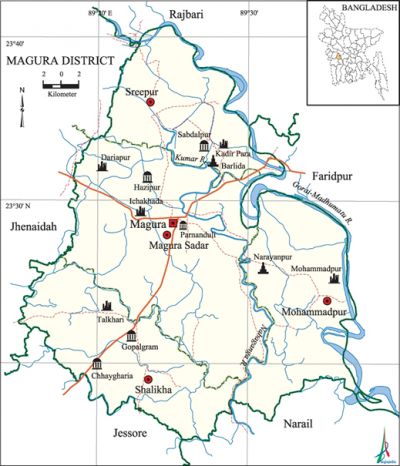Magura District
Magura District (khulna division) area 1039.10 sq km, located in between 23°15' and 23°41' north latitudes and in between 89°15' and 89°42' east longitudes. It is bounded by rajbari district on the north, jessore and narail districts on the south, faridpur district on the east, jhenaidah district on the west.
Population Total 918419; male 454739, female 463680; Muslim 753199, Hindu 164578, Buddhist 6, Christian 393 and others 243.
Water bodies Main rivers: gorai-madhumati, Nabaganga, kumar.
Administration Magura sub-division was established in 1945 and it was turned into a district on 1 March 1984.
| District | |||||||||
| Area (sq km) | Upazila | Municipality | Union | Mouza | Village | Population | Density (per sq km) | Literacy rate (%) | |
| Urban | Rural | ||||||||
| 1039.10 | 4 | 1 | 36 | 513 | 711 | 120414 | 798005 | 884 | 50.6 |
| Others Information of District | ||||||||
|
Name of Upazila |
Area |
Municipality |
Union |
Mouza |
Village |
Population |
Density |
Literacy rate |
| Magura Sadar | 401.58 | 1 | 13 | 200 | 241 | 380107 | 947 | 52.4 |
| Mohammadpur | 233.70 | - | 8 | 131 | 188 | 207905 | 890 | 47.7 |
| Shalikha | 228.65 | - | 7 | 102 | 118 | 163658 | 716 | 49.0 |
| Sreepur | 175.15 | - | 8 | 79 | 164 | 166749 | 952 | 51.8 |
Source Bangladesh Population Census 2011, Bangladesh Bureau of Statistics.

War of Liberation Magura was under Sector 8 during the war of liberation. About 16 encounters were held between the freedom fighters and the Pak army in Magura district during this time. The Pak army buried alive 6 freedom fighters at a place near Shatakhali Road on the Magura-Jessore highway. Besides, 7 freedom fighters were killed by the razakars at Talkhari. There are mass graves at 4 places (Magura PTI compound, WAPDA Canal, Binodpur Bazar Ghat, Galakata Bridge at Chhaigharia;) of Magura district; a memorial monument has been built at the PTI main gate adjacent to the Magura Bishwa Road.
Literacy rate and educational institutions Average literacy 50.6%; male 52.9%, female 48.5%. Educational institutions: college 17, secondary school 115, primary school 370, satellite school 21, kindergarten 3, brac school 124, community school 134, madrasa 76. Noted educational institutions: Government Hossain Shahid Suhrawardi College (1940), Magura Government Boys' High School (1854), Nohata Rani Patit Pabani High School (1924), Gangarampur PK Secondary School (1900), Nakol Raicharan Secondary School (1901), Sreepur MC Pilot Secondary School (1902), Binodpur Basant Kumar Multilateral Secondary School (1904), Hazipur Secondary School (1914), Shatrujitpur Kaliprasanna Secondary School (1919), Dhuljora Chura Gati Pratapchandra Secondary School (1927), Shimakhali Primary School (1932), Bororia AW Senior Madrasa (1907), Nohata AG Fazil Madrasa (1921).
Main sources of income Agriculture 66.3%, non-agricultural labourer 2.65%, industry 1.29%, commerce 12.34%, transport and communication 3.59%, service 7.85%, construction 1.34%, religious service 0.14%, rent and remittance 0.43% and others 4.07%.
Newspapers and periodicals Daily: Khedmat; weekly: Angikar, Grameen Bangla.
Folk culture Jarigan, Sarigan, Bhatiali, Kavigan, Haloigan, Jatra, Pala are notable. [Abu Naser Majnu]
See also The upazilas under this district.
References Bangladesh Population Census 2001 and 2011, Bangladesh Bureau of Statistics; Cultural survey report of Magura District 2007; Cultural survey report of upazilas of Magura District 2007.
